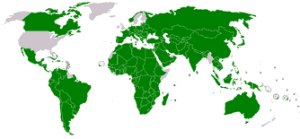Tripatini
the world's smartest travel social network
Costa Rica tourism industry signs Global Code of Ethics
Fifty-three tourism companies in Costa Rica have agreed to uphold the Global Code of Ethics for Tourism of the United Nations World Tourism Organization (UNWTO).
At the 55th meeting of the Commission of the World Tourism Organization (UNWTO) for the Americas, held for the first time in Costa Rica from May 13-15, 2013, the national tourism companies signed the Global Code of Ethics for Tourism (GCET), committing to the development of responsible and sustainable tourism. The GCET is composed of 10 principles that guide governments, the travel industry, communities and tourists in economic, social, cultural and environmental components of tourism.
Adopted in 1999 by the General Assembly of the World Tourism Organization, the GCET is not legally binding. The Code is voluntary and is governed by the World Committee on Tourism Ethics (WCTE), to which stakeholders may refer matters concerning the application and interpretation of the document.
 Members of the World Committee for 2012-2013 were elected by the UNWTO Regional Commissions and the UNWTO Affiliate Members, and endorsed by the UNWTO General Assembly at its 19th session in October 2011. Members represent UNWTO's six Regional Commissions – Africa, Americas, East Asia & Pacific, Europe, Middle East, and South Asia. For the Americas, the Committee Member is Mr. Hermes Navarro del Valle of Costa Rica.
Members of the World Committee for 2012-2013 were elected by the UNWTO Regional Commissions and the UNWTO Affiliate Members, and endorsed by the UNWTO General Assembly at its 19th session in October 2011. Members represent UNWTO's six Regional Commissions – Africa, Americas, East Asia & Pacific, Europe, Middle East, and South Asia. For the Americas, the Committee Member is Mr. Hermes Navarro del Valle of Costa Rica.
"UNWTO is guided by the belief that tourism can make a meaningful contribution to people's lives and our planet. This conviction is at the very heart of the Global Code of Ethics for Tourism, a roadmap for tourism development," states UNWTO Secretary-General Taleb Rifai (2010-present) on UNWTO's website.
On the UNWTO website there is an excellent brochure called "Practical Tips for the Global Traveler" that highlights the principles of the GCET directly related to tourists, in order to help guide travelers in making their behavior more responsible. The brochure is downloadable in PDF format and is available in 5 languages.
 Tour operators, hotels, travel agencies and rent-a-car companies were some of the Costa Rican tourism businesses who agreed on a voluntary basis to the guidelines. Top Costa Rica surf school, Del Mar Surf Camp, was one of those that signed the Global Code of Ethics for Tourism. Del Mar is affiliated with Costa Rica's National Tourism Chamber, the Costa Rican Tourism Board, the International Surfing Association, and the Central Pacific Chamber of Commerce.
Tour operators, hotels, travel agencies and rent-a-car companies were some of the Costa Rican tourism businesses who agreed on a voluntary basis to the guidelines. Top Costa Rica surf school, Del Mar Surf Camp, was one of those that signed the Global Code of Ethics for Tourism. Del Mar is affiliated with Costa Rica's National Tourism Chamber, the Costa Rican Tourism Board, the International Surfing Association, and the Central Pacific Chamber of Commerce.
 Del Mar Surf Camp specializes in Costa Rica surf vacations for beginners and advanced surfers, family and group vacations, women-only trips, yoga-surf retreats, stand-up paddle programs, and day surf lessons. They operate in three locations in Costa Rica: Hermosa Beach on the Central Pacific Coast, Santa Teresa Beach on the Pacific's Nicoya Peninsula, and Nosara Beach on the Guanacaste Pacific Coast.
Del Mar Surf Camp specializes in Costa Rica surf vacations for beginners and advanced surfers, family and group vacations, women-only trips, yoga-surf retreats, stand-up paddle programs, and day surf lessons. They operate in three locations in Costa Rica: Hermosa Beach on the Central Pacific Coast, Santa Teresa Beach on the Pacific's Nicoya Peninsula, and Nosara Beach on the Guanacaste Pacific Coast.
Get away from your daily routine of life, have fun on an adventure, experience new places, make new friends, and create memories that will last a lifetime on a Costa Rica surf vacation.
The GCET's 10 principles are:
- Article 1: Tourism's contribution to mutual understanding and respect between peoples and societies: It promotes responsible tourism that adheres to ethical values common to humanity, and tolerance and respect for diversity. It also states that it is the task of public authorities to protect tourists and visitors and their belongings. Tourists and visitors have the responsibility to acquaint themselves, even before their departure, with the characteristics of the countries they are preparing to visit, and host communities must respect the tourists who visit them.
- Article 2: Tourism as a vehicle for individual and collective fulfillment: It states that travel is an irreplaceable factor of self-education, mutual tolerance and for learning about the legitimate differences between peoples and cultures and their diversity; it advocates respect for equality and human rights.
- Article 3: Tourism, a factor of sustainable development: It mandates safeguarding the natural environment.
- Article 4: Tourism, a user of the cultural heritage of mankind and contributor to its enhancement: Tourism policies and activities should be conducted with respect for the artistic, archaeological and cultural heritage, which they should protect and pass on to future generations.
- Article 5: Tourism, a beneficial activity for host countries and communities: Tourism policies should be applied in such a way as to help to raise the standard of living of the populations of the regions visited and meet their needs.
- Article 6: Obligations of stakeholders in tourism development: Tourism professionals have an obligation to provide tourists with objective and honest information on their places of destination and on the conditions of travel, hospitality and stays.
- Article 7: Right to tourism: The discovery and enjoyment of the planet's resources constitutes a right equally open to all of the world's inhabitants.
- Article 8: Liberty of tourist movements: Tourists and visitors should have the liberty to move within their countries and from one State to another, in accordance with Article 13 of the Universal Declaration of Human Rights, and without being subject to excessive formalities or discrimination.
- Article 9: Rights of the workers and entrepreneurs in the tourism industry: The fundamental rights of salaried and self-employed workers in the tourism industry and related activities should be guaranteed under the supervision of the national and local administrations.
- Article 10: Implementation of the principles of the Global Code of Ethics for Tourism: The public and private stakeholders in tourism development should cooperate in the implementation of these principles and monitor their effective application.
By Shannon Farley
Videos
Groups
-
India
173 members
-
Tour Operators
873 members
-
Ireland
93 members
-
South Dakota
17 members
-
Azerbaijan
17 members
-
Shopping the World
55 members
-
Tech for Travel/Hospital…
87 members
-
Andorra
26 members
-
Online Corner
75 members
-
Minnesota
22 members
-
Backpackers & Hostels
84 members
-
Portugal
60 members
-
Turks and Caicos
26 members
-
Agritourism/Farmstays
72 members
-
Zambia
21 members
© 2024 Created by EnLinea Media.
Powered by
![]()
Badges | Report an Issue | Privacy Policy | Terms of Service
You need to be a member of Tripatini to add comments!
Join Tripatini